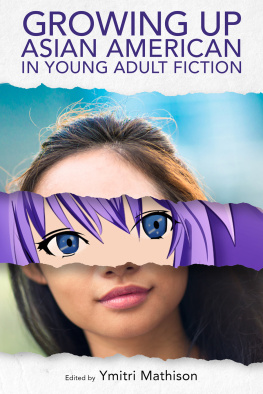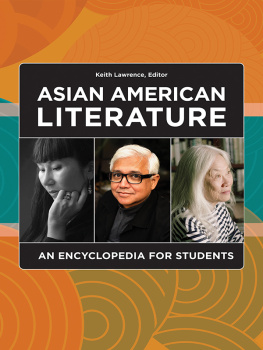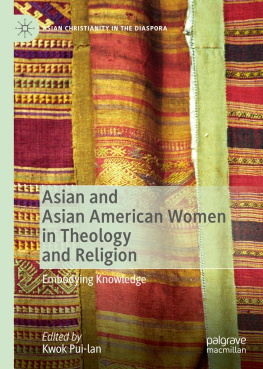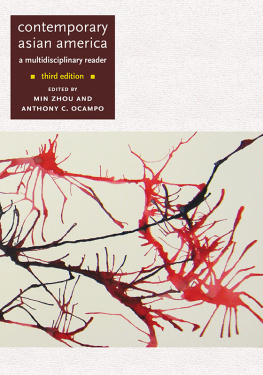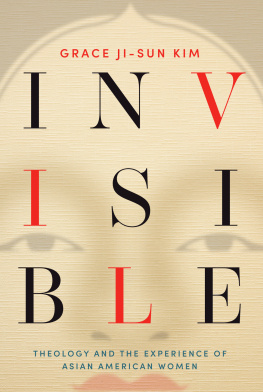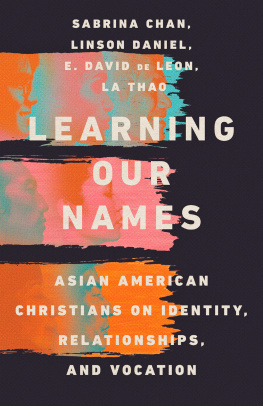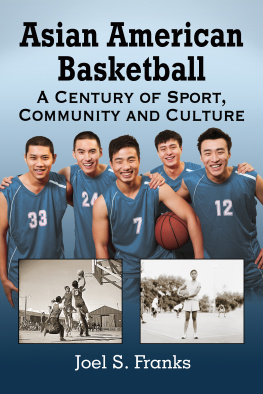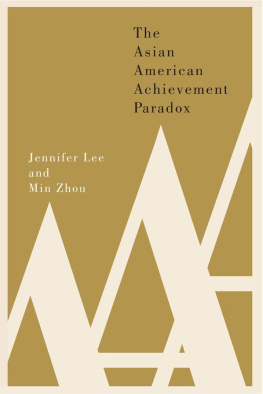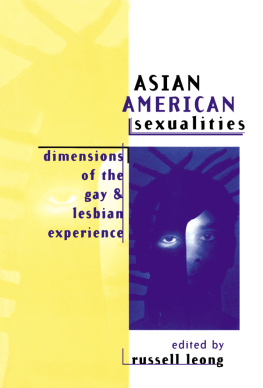
GROWING UP
ASIAN AMERICAN
IN YOUNG ADULT FICTION
GROWING UP
ASIAN AMERICAN
IN YOUNG ADULT FICTION
Edited by Ymitri Mathison
University Press of Mississippi / Jackson

Childrens Literature Association Series
www.upress.state.ms.us
The University Press of Mississippi is a member of the Association of American University Presses.
Copyright 2018 by University Press of Mississippi
All rights reserved
Manufactured in the United States of America
First printing 2018
Library of Congress Cataloging-in-Publication Data
Names: Mathison, Ymitri, editor.
Title: Growing up Asian American in young adult fiction / edited by Ymitri Mathison.
Description: Jackson : University Press of Mississippi, 2017. | Series: Childrens literature association series | Includes bibliographical references and index. |
Identifiers: LCCN 2017025003 (print) | LCCN 2017036806 (ebook) | ISBN 9781496815071 (epub single) | ISBN 9781496815088 (epub institutional) | ISBN 9781496815095 ( pdf single) | ISBN 9781496815101 (pdf institutional) | ISBN 9781496815064 (hardback)
Subjects: LCSH: Young adult literature, AmericanHistory and criticism. | Asian Americans in literature. | American literatureAsian American authorsHistory and criticism. | American literatureMinority authorsHistory and criticism. | Immigrants in literature. | Asian Americans in popular culture. | Childrens literature, AmericanHistory and criticism. | BISAC: LITERARY CRITICISM / Childrens Literature. | LITERARY CRITICISM / American / Asian American. | SOCIAL SCIENCE / Ethnic Studies / Asian American Studies.
Classification: LCC PS374.Y57 (ebook) | LCC PS374.Y57 G76 2017 (print) | DDC 813.009/9283dc23
LC record available at https://lccn.loc.gov/2017025003
British Library Cataloging-in-Publication Data available
To my mother,
for having always believed in me
CONTENTS
YMITRI MATHISON
TOMO HATTORI
MARY J. HENDERSON COUZELIS
JENNIFER HO
LINDA PIERCE ALLEN
TRAISE YAMAMOTO
SARAH PARK DAHLEN
LAN DONG
HENA AHMAD
LEAH MILNE
JOY TAKAKO TAYLOR
ACKNOWLEDGMENTS
I would like to thank all of the contributors to this collection for their hard work, patience with the process, and dedication to the project.
Many thanks to Holly Monteith for her excellent copyediting.
I am grateful to James Palmer, associate provost, and Danny Kelley, dean of the Brailsford College of Arts and Sciences, at Prairie View A&M University for supporting this project through course releases and with departmental and college grants.
This project would not have been possible without the full support, encouragement, and patience of my husband, Craig, especially during all the evenings when I was on the computer.
GROWING UP
ASIAN AMERICAN
IN YOUNG ADULT FICTION
Introduction: Growing Up Asian American in Young Adult Fiction
Ymitri Mathison
As the invisible minority, Asian Americans are generally stereotyped under one monolithic umbrella, with most Americans not aware of the diversity of ethnicities and races the term comprises. Asian American children and adolescents are even more invisible than adults. Frequently stereotyped under the rubric of the model minority myth, Asian American kids feel pressured to perform academically, especially in the science, technology, engineering, and mathematics (STEM) fields. Many also feel they should be disinterested in or not good at sports, except, of course, martial arts. Boys are expected to be physically unattractive nerds, while girls are expected to be petite and beautiful. Asian American kids are also made invisible by mainstream society through a willful blindness: they are frequently not seen as a minority but rather as honorary whites, assumed to have the conservative white values of family and a strong work ethic even while having the distinctive Asian characteristic of not asserting themselves. Their very abilities to assimilateseemingly to subsume their ethnic identity into whiteness and to perform within the mainstream cultureare made into an asset. Given this conundrum, how do Asian American children assert their subjectivity or identity in American society? How do they not only become Asian and American but also retain their ethnicity?
The various young adult(YA) novels analyzed in Growing Up Asian American in Young Adult Fiction go beyond the stereotypes that Asian American children and adolescents face in society by depicting how their characters define their unique identities within both mainstream society and their ethnic communities and families. Such identity work is not new. In 1930, sociologist Max Handman noted that American society has no social technique for handling partly colored races,1 or, in other words, Americans who are not white but who are also not of African descent. He pointed out that the Mexican is not a Negro, and [that] the white man refuses him an equal status.2 Though the focus of Handmans research was on Mexican farmworkers, his failure to even mention the existence of Asian and Asian American farmworkers on the West Coast and in Hawaii is just one of many examples of Asian Americans being ignored by the larger American society.
Such invisibility is still the norm more than eighty-five years later. As David Leiwei Li argues, Asian Americans are strangled between the authentic white subject and the oppositional black subject, with Asian Americans at once defined and derealized.3 Because they are essentially not seen as a racial threat the way African Americans often are, they are dismissed under the rubric of the model minority stereotype. Although Asians have been in the United States for the past three centuries, when white Americans encounter Asian Americans, they often assume they must be recent immigrants to this country and that they do not belong here. Asian Americans may be considered to be perpetual foreigners or immigrants rather than natives.
The Asian American teenager must deal with a society that sees him or her within a model minority stereotype and as an exoticized perpetual foreigner. It is not unusual for Asian American youths, especially South Asians and Muslims, to hear, Go back to your country. As a result, growing up in the United States in the latter part of the twentieth and the early twenty-first centuries, during a time of multiculturalism and within the age of globalization and extensive immigration from the Asian continent, first-, 1.5-, second-, and multiple-generation Asian American children and adolescents need to navigate between more than their ethnicity and the mainstream culture; they must also negotiate between their parents homelands, their immigrant communities within the United States, their ethnic American (second-generation) communities, and mainstream American society. Asian American kids also face the same issues children or teenagers of any race may encounter, such as anxieties surrounding their changing bodies, sexuality, and identities as a part of growing up.
The chapters in this book address the complex negotiations in which the fictional Asian American child or teenager must engage, personally and across national borders, which can include different ethnicities, races, languages, and cultures. The Asian American teenager must synthesize multiple identities and communities while attempting to define a unique identity. Aihwa Ong suggests that the term
Next page
